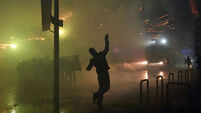US wins backing for Iraq resolution
The United States won unexpected support for its new Iraq resolution and was confident of winning approval in a vote Washington hopes will attract troops and money to stabilise the war-battered country and put it on the road to independence.
German Chancellor Gerhard Schroeder said that Germany, France and Russia - Europe’s leading opponents to the US-led war in Iraq – will vote in favour of the UN resolution on Iraq.














